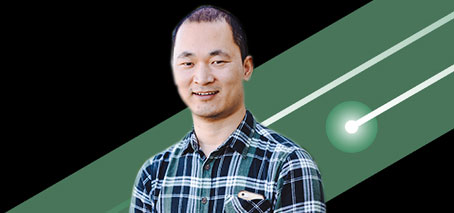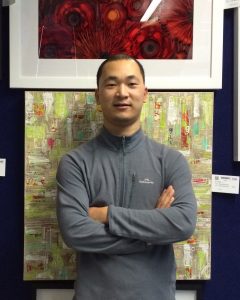A team led by FLEET CI Prof Xiaolin Wang (University of Wollongong) has won a linkage project for topological materials based thermoelectricity.
Thermoelectricity can directly convert heat to electrical energy or vice-versa. It plays an important role in renewable and sustainable energy by harvesting waste heat, which is widely available in human body, computer chips, sunlight and steel industry. Thermoelectric efficiency is determined by the figure of merit ZT = S2σT/κ, where σ is the electrical conductivity, S is the Seebeck coefficient, T is the absolute temperature, and κ is the thermal conductivity. As the ZT of conventional thermoelectric materials is limited to about 1, current thermoelectric devices are still not competitive with other energy generation technologies like solar cells.
This February, Prof. Wang’s team reported an effective approach to remarkably enhance the thermoelectric performance of p‐type BiSbTe topological material by incorporating carbon microfibers (Figure 1). They achieved a high ZT of 1.4 at 375 K and high average ZT of 1.25 for temperatures in the range of 300 to 500 K in the BiSbTe/carbon microfiber composite materials. The efficiency of the latter materials has been enhanced by 70% compared with the commercial Bi2Te3-based materials. The materials demonstrate a high average ZT and excellent mechanical properties and are strong candidates for practical applications.

Significant Enhancement of Thermoelectric Figure of Merit in BiSbTe‐Based Composites by Incorporating Carbon Microfiber. Adapted from Yang, et. al, Advanced Functional Materials, 31(15), 2008851, 2021.
Recently, a team consisting of Prof. Wang, Dr Yue, Dr Cortie and Dr Rule won a competitive linkage project. This project will focus on the breakthrough achievement in record-breaking antinomy telluride topological materials. The primary aim of this project is to apply this knowledge of advanced composites to real-world thermoelectric generators by using additive manufacturing to produce cost-competitive generators. This project will provide significant benefits to both local partner organisations and Australian renewable energy technologies.
The Australian Research Council Linkage Program promotes national and international research partnerships between researchers and business, industry, community organisations and other publicly funded research agencies. By supporting the development of partnerships, the ARC encourages the transfer of skills, knowledge and ideas as a basis for securing commercial and other benefits of research.
More information
- Contact Prof Xiaolin Wang (University of Wollongong) xiaolin@uow.edu.au
- Read: Thermoelectric devices convert waste heat from industry into viable new energy source
- Read: Game-changer in thermoelectric materials: decoupling electronic and thermal transport
—written by FLEET Research Fellow Dr Zengji Yu


